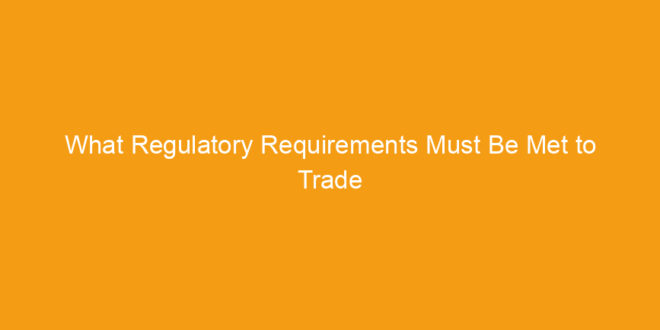In order to trade futures with Interactive Brokers, customers must meet certain regulatory requirements. These requirements include but are not limited to:
• Being of legal age to trade in the respective country or jurisdiction.
• Having sufficient knowledge and understanding of trading in futures contracts and the risks associated with such trading.
• Being able to financially bear any losses that may arise from trading in futures contracts.
• Meeting the minimum account equity requirements specified by Interactive Brokers.
• Having a valid government-issued identification document.
• Having a valid bank account in the same name as the trading account.
• Completing the customer account application and agreement required by Interactive Brokers.
• Providing the necessary documentation that confirms the customer’s identity and residence.
• Adhering to the rules and regulations that govern futures trading.
Interactive Brokers reserves the right to refuse service to any customer who does not meet these regulatory requirements. Customers should contact Interactive Brokers for more information on the specific requirements they must meet prior to trading futures with them.
Understanding the Margin Requirements for Futures Trading with Interactive Brokers
Margin requirements for futures trading with Interactive Brokers are important to understand when engaging in the futures market. Margin requirements are determined by the exchanges, clearing firms and brokers, and they can vary depending on the market and the underlying security.
When trading futures with Interactive Brokers, margin requirements are based on the exchange’s initial margin requirements and typically reflect the greater of the initial margin requirement or the maintenance margin requirement. Initial margin requirements are the amount of funds that must be deposited with the broker in order to enter a futures contract. Maintenance margin requirements are the amount of funds that must be maintained in the account in order to keep the position open.
In order to determine the margin requirement for a particular futures contract, a trader must first determine the initial margin requirement. This can be done by checking the exchange’s margin requirements or by consulting with Interactive Brokers. Once the initial margin requirement has been determined, the trader must then determine the maintenance margin requirement. This can be done by checking the exchange’s maintenance margin requirements or by consulting with Interactive Brokers.
The margin requirement for a futures contract can also change depending on the market conditions. For example, if the market is volatile, the margin requirement may increase to protect the broker from potential losses. Conversely, if the market is calm, the margin requirement may decrease. Therefore, it is important for traders to remain aware of the changing margin requirements.
Finally, it is important to note that margin requirements are not static and may be subject to change. As such, it is important for traders to stay up to date on the latest margin requirements in order to ensure that the appropriate amount of funds is available in the trading account.
What Types of Accounts Can Be Used to Trade Futures with Interactive Brokers?
Interactive Brokers offers a variety of account types that can be used to trade futures, including individual and joint accounts, as well as corporate and trust accounts. All of these account types have access to the same range of futures markets, and all of them offer the same level of service and support.
Individual Accounts are designed for individual traders and investors who wish to manage their own investments. With this type of account, you will have access to a wide range of futures markets, including commodities, currencies, indices, and more.
Joint Accounts are designed to be used by two or more people as joint owners of the investment. This type of account is ideal for couples who wish to manage their investments together.
Corporate Accounts are designed for companies and organizations that wish to trade futures. This type of account is highly customizable, and can be tailored to meet the specific needs of the company.
Trust Accounts are designed for individuals or businesses that wish to invest on behalf of another. These accounts are typically used for estate planning, or for businesses that wish to manage their investments for the benefit of their clients.
In addition to the account types listed above, Interactive Brokers also offers a range of discretionary accounts, which allow a third party to manage the account on the behalf of the owner. These accounts are ideal for those who do not have the time or expertise to manage their investments themselves.

